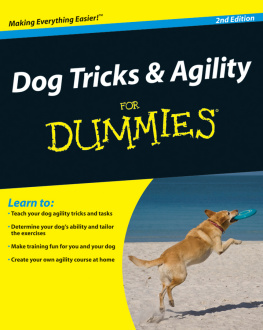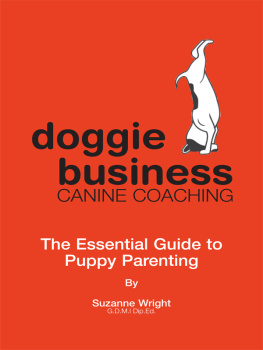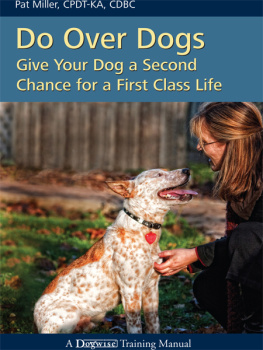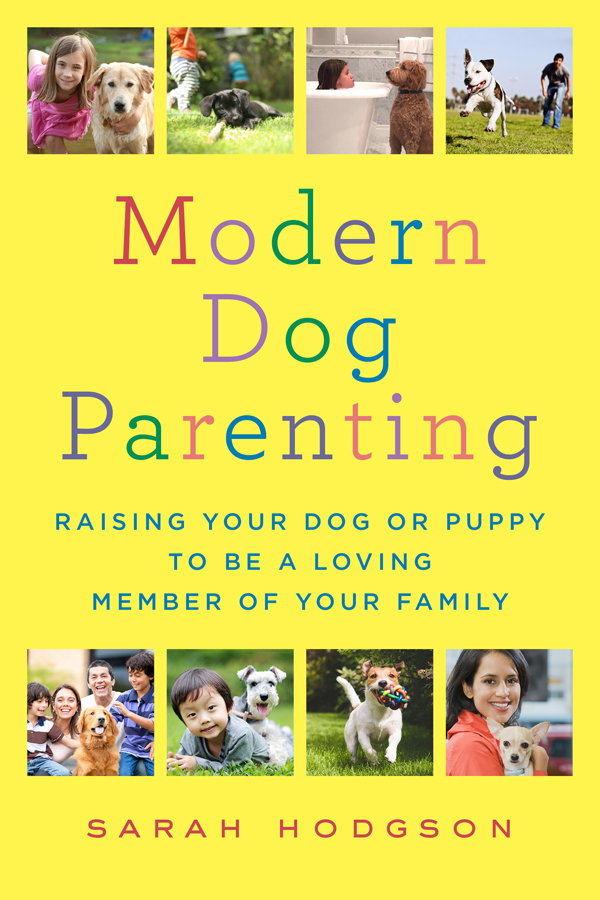Contents
Guide

The author and publisher have provided this e-book to you for your personal use only. You may not make this e-book publicly available in any way. Copyright infringement is against the law. If you believe the copy of this e-book you are reading infringes on the authors copyright, please notify the publisher at: us.macmillanusa.com/piracy.
For my Saint, who answers to the name of Roman and is known to all as my husband. Thanks, honeyI could never have discovered so much joy (or picked up so much dog poop) without you.
Sarah Hodgson has been a friend and colleague of mine for many years and weve worked on several projects together. Shes an insightful and compassionate dog person and a warm and engaging people persona lucky combination indeed. I was pleased when she asked me to write a foreword to her upcoming book.
When she sent me the manuscript for Modern Dog Parenting I knew right away that Sarah was onto something. Millions of dog owners feel deeply connected to their canine companions and its clear that dogs can respond in kind. Through careful research and copious examples, Sarah shows that even though we arent our dogs actual parents, recent human psychological data and our expanding understanding of the canine mind suggest that we may as well be. Sarah wants us all to embrace our inner dog parent.
Dont be embarrassed if you go a little overboard with your dogs. A survey of one thousand people conducted by Kelton Research revealed that 81 percent of respondents considered their dogs to be equal in status to children. More than half (54 percent) refer to themselves as pet parents rather than pet owners. Even more (58 percent) use common parental nicknames like Mommy or Daddy when speaking in reference to their dogs. Theres a pretty big number of people (35 percent) who call their dogs children and 10 percent celebrate Mothers and/or Fathers Day with their dogs.
Do you talk to your dog? Youre in the majority. Seventy-seven percent of pet owners talk to their dogs and most of us use the same language and rhythms that we use when we talk to our kids. Brain scans show that certain emotional centers are activated in the brain when we talk to our children and guess what? When we talk to our dogs, the same areas are triggered.
And theres more. Many dogs have the same rights and obligations of children. Nearly 72 percent of dog owners who have (two-legged) children apply the same disciplinary standards to the dogs as they do to their kids and most dog parents provide their dogs with their own chair, sofa, or bed.
Can we justify these attitudes towards our dogs? In Modern Dog Parenting , Sarah presents evidence that suggests that your dogs mind is roughly equivalent to a human two- to three-year-old child when it comes to problem solving, language use, and emotional behavior. And even more compelling, dogs tend to respond to their owners in very much the same way that human children respond to their parents. Our dogs are already treating us as parents! Sarah feels its not only justified, its imperative.
Any sort of parenting is hard sometimes. Shortly after my daughter Rebecca gave birth to my first grandchild she called me in an emotional state. Daddy, she said, I dont know if I know how to be a real parent. I feel like Im making mistakes or at least not using best practices with my baby. I knew that my daughter was a wonderful mother and I reassured her as best I could but I couldnt fully answer her when she asked why, since parenting was so important, our brains were not pre-wired with an instruction manual.
Dog parents often feel this same frustration. You stare down at a vulnerable, dependent creature and wonder if youre doing things right. Youll ask yourself Am I raising this dog correctly? Am I teaching my dog how to communicate properly? How do I teach my dog to be a responsible citizen and a good family member? Can I expect the same kind of adolescent rebellion from my dog as I experience with my children? And where the heck is the instruction manual?
Puppies dont come with owners manuals and our brains are not hardwired for dog parenting but the book that you hold in your hand is a pretty good substitute. In addition to providing some understanding about the way dogs think, and their similarities to human kids, this book covers the broad spectrum of issues which any dog owner is apt to run into when they are integrating a furry child of the canine variety into their family. Whether you are beginning with a new puppy, adopting an adult or older dog, or simply helping your present pet dog navigate through the various stages of its life, this book will provide a readable and practical set of guidelines. It will help you raise a well-mannered dog without major problems, and most importantly, a dog that is happy with its life and well integrated into your family, which could make you a happier person (or is that a happier dog parent?).
Stanley Coren, Ph.D., DSc, FRSC, bestselling author of How Dogs Think and How to Speak Dog
I want you to know that I do get it: Living with a dog can be overwhelming. Raising a dog is a project, butwith the right approachcan be a fun adventure.
Dogs are so trusting, after all. From the minute they waddle into our hearts and homes, they follow our gestures and, when raised with people, will often prefer our company to that of other dogs. Like toddlers, they are eager to explore, play, and problem solve.
Throughout this book, youll discover recent studies by well-respected scientists and behaviorists that show that dogs learn more quickly and effectively through positive reinforcement rather than negative, which is just fancy talk for the popular idiom: You attract more bees with honey than with vinegar! Or as I like to paraphrase it: You teach more with rewards than with retaliation.
No matter where you are in the processjust starting out with a puppy or adopting an older dogIll help you figure everything out. Well begin with a little perspectiveyour dogs mistakes may be easier to forgive once you understand where theyre coming from. After youve determined their emotional IQ (and yours!), well start lessons, then shift to problem-solving strategies. Throughout each chapter youll find boxes and games thatll help you to jump-start your Happy Dog Adventure Story today!
It All Starts with Forgiveness
Maybe, like a lot of dog lovers, youve gotten madreally madat your dog, and youve done things you regret. Forgive yourself. Not only do I understand this, but Ive been there. Life can be really stressful at times. Having a dog doesnt make it any easier.
Perhaps youve been lured by the dominance myth, listening to or hiring someone who convinced you that cruel is kind. Cruel is not kind. People who use negative reinforcement are intimidating. This is more than ineffectiveit can be dangerous. People who jerk, shock, or bully dogs into submission teach their pets by example. Dogs often retaliate by targeting a less assertive grown-up or child.
The good news is this: Your dog is not interested in a hostile takeover. Trust me. He just wants to know how to fit in. Ill help you teach him. Some adolescent dogs enjoy testing the limits of what they can get away with, not so unlike I did when I was a teenager; maybe you did, too. Think back. Have empathy.
Modern dogs need our support now more than ever. Living inside, theyre expected to comply with our schedules and limitations and adhere to home rules that, from their vantage point, make little sense. We want them to listen when we speak, respect our stuff, and busy themselves when were preoccupied. Dogs arent pets anymoretheyre children! Fortunately, the timing is right81 percent of dog owners polled consider their dog family. Parenting dogs isnt such a bad idea after all.










